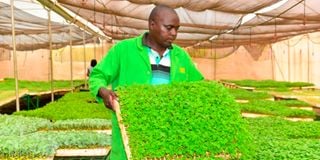Tomato processor promises more earnings for farmers

Michael Njue at his tomato seedlings greenhouse in Kimbimbi, Kirinyaga County.
What you need to know:
- Kirinyaga County produces about 60,000 tonnes of tomatoes every year, earning local farmers around Sh1.6 billion.
Through tomato growers' cooperative societies, farmers will aggregate their produce and negotiate for better prices.
The devolved government of Kirinyaga has launched a programme to support tomato growing in readiness for the proposed Sagana Agro-Industrial City.
To scale up production, the county government is working with 69 community groups to build greenhouses and propagate high-yielding disease-tolerant varieties as well as training along the tomato value chain.
Kirinyaga County produces about 60,000 tonnes of tomatoes every year, earning local farmers around Sh1.6 billion.
Through a programme called Wezesha, more than 2,000 farmers have been supported to plant an additional 1.1 million seedlings and increase land under tomatoes by an extra 122 acres.
This, agriculture officials say, has increased production by about 11,000 tonnes.
Governor Anne Waiguru says farmers in Kirinyaga will be the biggest beneficiaries of the agro-industrial city as there will be a ready market for their produce. The city will have a tomato processor.
Additionally, the farmers will be cushioned against post-harvest losses and reap more from value-addition, the county boss says.
Through tomato growers cooperative societies, farmers will aggregate their produce and negotiate for better prices.
They will also get the necessary training and be part of the supply chain as the tomatoes make their way to the processor.
The devolved government has already built an exclusive aggregation centre in Makutano, where buyers will be collecting tomatoes in bulk.
One of the beneficiaries of the tomato value chain support is James Muriithi, the Mwihotori Youth Group chairman.
The Kerugoya-based group was supported financially to build a greenhouse and install a drip irrigation system. It was also supplied with high-yielding and disease-resistant tomato seedlings by the county government. Group members are continuously educated on good agricultural practices, thus enabling them to nurture their crop as required.
“Mwihotori Youth Group expects a bumper harvest in the coming two months,” Muriithi says.
While the group’s crop is at the fruiting stage, members have replicated the project at individual level. They have utilised the knowledge gained from the project in their farms.
Muriithi adds that while the group’s initial market will be Kerugoya and surrounding towns, members anticipate better returns once the processor starts operating.
He says before the intervention by the devolved government, group members used traditional methods to grow tomatoes.
Unfortunately, that usually resulted in the plants and fruits being wiped out by pests and diseases.
The traditional farming methods were expensive and would not guarantee the crops reaching maturity.
“The good thing with greenhouse farming is that tomatoes are protected from diseases and pests,” Muriithi says.
“That reduces the need for herbicides and pesticides, eventually cutting the cost of production by a huge margin.”
Muriithi says the variety grown is high-yielding, with a year-long duration of production, making tomato growing more profitable than before.
While some groups have been working with the devolved government to grow tomatoes, individuals like Michael Njue have been encouraged to propagate seedlings.
Njue runs a seedlings propagation business in Kimbimbi, Mwea Sub-County, where he established a greenhouse after being trained by county government experts.
He initially operated a traditional tree nursery but after the training, Njue set up the greenhouse and adopted modern seedling propagation techniques.
That has led to increased production, reduced labour costs and improved his earnings. Njue also received training in marketing his seedlings.
He has had customers throughout the country through online marketing.
“Through this business, I have met my family’s needs and even acquired property. I have employed seven people and contract more during the high season,” he says.
Njue adds that producing tomato seedlings has meant that local farmers do not incur huge transport costs. Before he established the business, farmers used to get seedlings from Naivasha, Nakuru County.
Getting seedlings locally means an improvement in profits too.
Njue sees a bright future, especially when the tomato processor begins operations.
He says demand for seedlings will be high as more farmers opt for tomato growing.
He thanks Kirinyaga County government for coming up with the programme.
“Young people need to know agripreneurship pays. There is money to be dug out of soil,” he says.
Governor Waiguru says through the Wezesha Kirinyaga programme, her administration is committed to making agriculture translate to more money into the farming communities.





